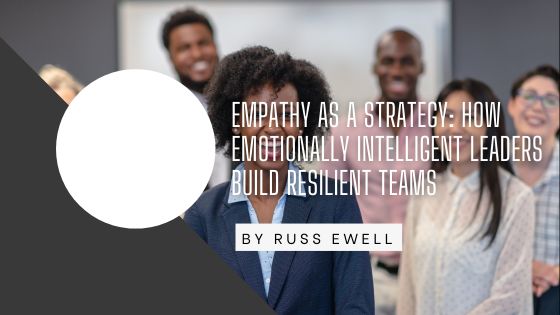In today’s rapidly changing work environments, resilience has become one of the most sought-after traits in teams. But resilience doesn’t emerge by chance—it’s cultivated. One of the most powerful tools leaders can use to build resilient, high-performing teams is empathy. Far from being a soft, secondary trait, empathy is a strategic leadership skill rooted in emotional intelligence (EQ) that drives trust, collaboration, and adaptability.
What is Empathy in Leadership?
Empathy in leadership means the ability to understand and share the feelings of others while using that understanding to guide behavior, communication, and decisions. It’s not about being overly emotional or making choices based purely on sentiment. It’s about being aware of what your team is going through and responding with intention.
Empathetic leaders listen deeply, validate emotions, and recognize individual challenges without immediately trying to fix or dismiss them. This approach not only builds psychological safety but also fosters stronger team cohesion.
The Link Between Empathy and Resilience
Resilience is the capacity to bounce back from adversity, stay engaged during change, and remain committed to a shared purpose. Empathy fuels resilience in several key ways:
-
Fostering trust: When team members feel seen and heard, they are more likely to trust their leaders and each other. Trust is the foundation of resilience—it allows teams to communicate openly, take risks, and support one another during setbacks.
-
Reducing burnout: Empathetic leaders are attuned to signs of stress and overload. By recognizing these signals early, they can adjust workloads, set realistic expectations, and encourage healthy work habits—preventing burnout before it takes root.
-
Encouraging adaptability: Empathy helps leaders understand how team members respond to change. With this insight, leaders can offer targeted support, helping individuals adapt rather than resist.
Empathy in Action: Practical Strategies
-
Practice active listening: Don’t just hear—listen to understand. Give team members your full attention during conversations, reflect back what you hear, and ask thoughtful follow-up questions.
-
Create space for vulnerability: Normalize conversations around stress, failure, and uncertainty. Leaders who share their own challenges create permission for others to do the same.
-
Check in regularly: A simple “How are you really doing?” can go a long way. Regular check-ins signal that you care beyond task completion.
-
Tailor your leadership style: Not everyone responds to challenges in the same way. Adapt your support based on individual needs and preferences.
The Strategic Payoff
Empathy isn’t just the right thing to do—it’s a smart leadership strategy. Empathetic teams are more innovative, engaged, and loyal. They’re better equipped to navigate uncertainty, embrace change, and collaborate effectively under pressure.
In a world where the only constant is change, leaders who prioritize empathy position their teams not just to survive, but to thrive.
